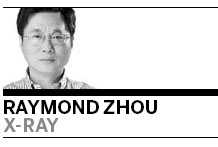
Nothing encapsulates this spirit better than A Dream Like a Dream, Stan Lai's eight-hour epic that opened the festival. But days after many watched this marathon piece, they still felt as if they were in a reverie, walking up and down the narrow streets and bumping into veteran theater artists and young peers - and of course the occasional street performers surrounded by a throng of festival participants and tourists and surprising them with a flash of theatrical ingenuity.
The person who hatched this intricate dream is Huang Lei, a movie and television star who came to Wuzhen in 2003 to direct and star in a TV series called Lost Time. A popular hit, it helped propel the small town that had recently started promoting tourism as its pillar industry into a wider public vista, and Huang has been associated with the place ever since, building a vacation home and opening a bar, also called Lost Time.
Five years ago, an idea dawned on him. "I want to create a theater festival for this town and for the young talents seeking a platform." He shared this "crazy thought" with his friend Chen Xianghong, president of Wuzhen Tourism Co Ltd, the company that runs the town's mainstay business. They talked about it for a year and half, ironing out various wrinkles. About three years ago, Huang started to enlist help from Stan Lai and Meng Jinghui, heavyweight players of Chinese-language theater.
A grand theater was built, at a cost of 400 million yuan ($65 million). Old houses and warehouses were refurbished and turned into smaller performing venues, some funky and some with refined traditional decor. The price tag for the infrastructure alone amounted to 500 million yuan. But Chen was unfazed: "I want the children of Wuzhen, my hometown, and its vicinity to enjoy the same kind of exposure to high arts as their peers in Shanghai. They deserve it."
And, of course, being a tourist mecca, the audiences hail from all corners of the nation, some even from overseas. Robert Brustein, founder of the Yale Repertory Theater and the American Repertory Theater, gushed about Wuzhen festival whenever he was asked for comment. As an honorary chairman, he talked about the history and current status of American theater and unconventional productions of Shakespeare at two of a dozen forums focusing on a rich variety of topics about theatrical arts. His play about the Bard, The Last Will, was featured at the festival as one of three foreign productions.
Still, Huang Lei is by far the busiest person on the scene. He was giving dozens of press interviews, explaining to all who would listen why he took the trouble to start this initiative. Most with an inquisitive eye had already found out for themselves that the festival, unlike many other cultural events in China, was actually about the art, not an extravaganza with little substance.
"At heart, I'm still a child," says Huang. "A child is not tired. I go to sleep and wake up fresh again. And a child is not too concerned about the hardships that may beset a project like this. I just go ahead and do it."
At 41, he looks deceptively youthful. Having started in showbiz at the tender age of 6, he has been basking in the glow of fame and fortune all his life. And he is far from reaching the end of his acting career, yet he wants to embark on a grander dream - something akin to Robert Redford launching Sundance as a platform for independent filmmakers.
Arguably the most crucial - but previously low profile - part of the festival is the young artists' competition. A total of 87 teams applied, out of which 12 were selected. They all had to incorporate three props - a flashlight, an old radio and a basin of water - plus the theme "reflect". It was amazing what the youths made out of these unique requirements. Some entries were all physical movements, others were comedic and still others lyrically poetic. (Full disclosure: I was one of the five jury members and had a ringside seat.)
As an art form that, in China, appeals mostly to the urban, young, well-educated and white-collar, theater is booming in major cities. Though we do not have an equivalent of Broadway or West End, there may be a dozen or more plays in production on any given day in a metropolis, and surprisingly, most rely on the market rather than on government subsidy. This attests to the vitality of theatrical art. The Wuzhen festival seems like a natural extension. It puts a stamp of chic or avant-garde on a heritage-rich place that is already trendy as a tourist destination, elevating it from a site of relaxation for the body and mind to one of nutrition for the heart and soul.
Barring any unexpected turn of events, such as outside pressure and intervention, the Wuzhen Theater Festival, which bolted out of the gate like a gale, could well be on its way to becoming an institution of theatrical arts in China. That you cannot detect from Huang Lei's amicable bearing. "This is my China dream," says the baby-faced actor and now co-founder of the festival. "We want to be loved by the world, and why not do it through arts?"
Contact the writer at raymondzhou@chinadaily.com.cn.
